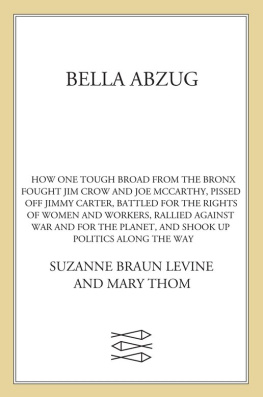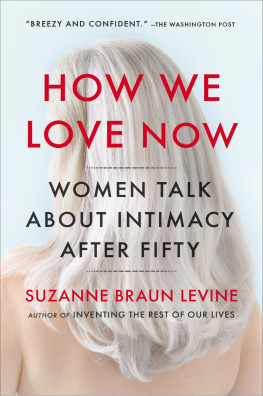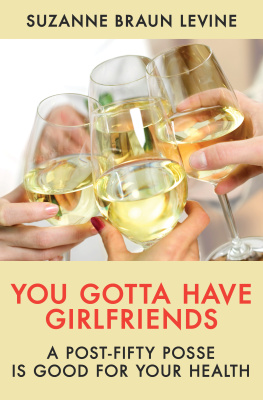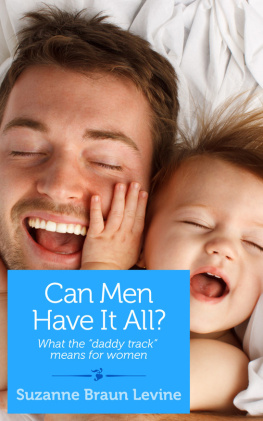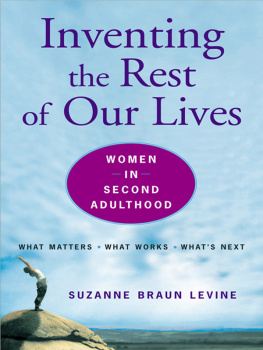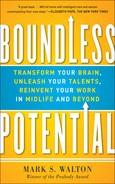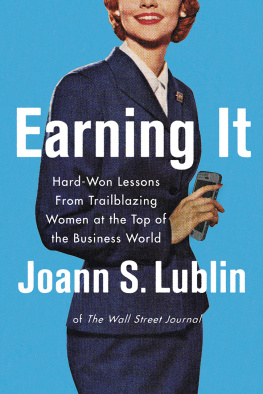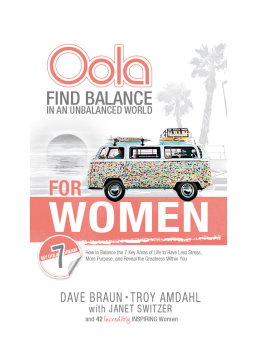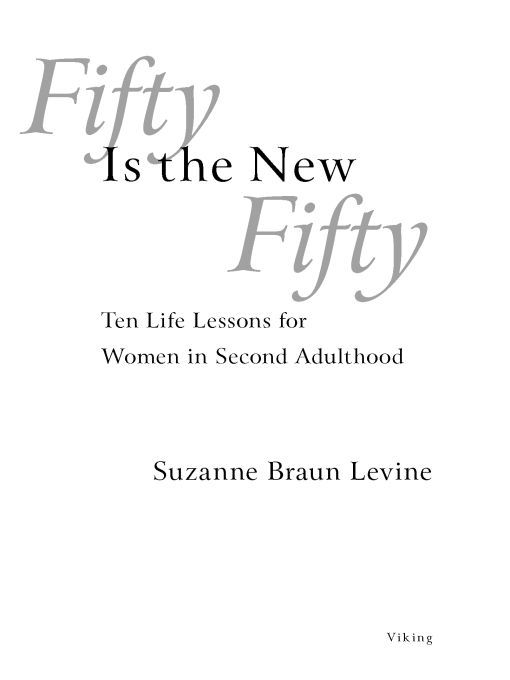Table of Contents
Also by Suzanne Braun Levine
Inventing the Rest of Our Lives: Women in Second Adulthood
Father Courage: What Happens When Men Put Family First
Bella Abzug: How One Tough Broad from the Bronx Fought Jim Crow
and Joe McCarthy, Pissed Off Jimmy Carter, Battled for the Rights
of Women and Workers, Rallied Against War and for the Planet,
and Shook Up Politics Along the Way, an oral history (with Mary
Thom)
For Bob
Acknowledgments
With tremendous gratitude to my at-home editor and husband, Bob Levine, and my truly masterful in-house editor, Wendy Wolf, I also want to thank the editors of More magazine for helping me shape my ideas about Second Adulthood. Thanks also to my agent, Janis Donnaud. I am grateful for the invaluable tech support I got from Reed Berkowitz, Karen Grenke, Rose Heredia, and my beloved son, Josh, Mr. Fix-it. Then there is the other and very precious kind of support: the love and encouragement of my indispensable circle of trust. And with this book there is a new source of information and goodwill: the 350 women who have signed up to be online friends of Second Adulthood and share their own experiences with me, and now with you, the readers. My mother, Esther Bernson Braun, remains an inspiration, and my dear daughter, Joanna, already embodies the energy, independence, and effectiveness that I still aspire to. Thank you all!
Lesson One
Fifty Is the New Fifty
We could not act our age if we did not know our age.... We live in the biochemistry of our bodies, and not in years; we live in the interaction between that biochemistry and its greatest productthe human mindand not in a series of decades marked by periodic lurches of change.
Dr. Sherwin B. Nuland, The Art of Aging: A Doctors Prescription for Well-being
Fifty is the new fifty. Sixty, I hasten to add, is also the new sixty, and seventy the new seventy. And the women who are the new fifty, sixty, and seventy wouldnt want to be anything else. Some people think they get the reinvention process we are going through when they extrapolate down a decade or twoI see, they say encouragingly, Fifty is the new thirty! as if the reward of what is clearly a major shift in outlook is a new lease on youth. That is not it at all. I have discovered that most women in Second Adulthood are very happy being where they arethey dont want to go back to any of their earlier stages or decades. And while we would all like to be stronger and fresherand more admired (or at least respected) by the world we live infew of us would like to be literally younger. The great thing about getting older, magical writer Madeleine LEngle, who lived well into her nineties, said, is that you dont lose all the other ages youve been. We are at a point where our lives are finally beginning to add up.
The assumption is that youthor at least youngeris the ideal state and that given a choice, no woman in her right mind would relinquish it. I have found the opposite to be true. Many of us are delighting in rejecting that backward-looking mind-set and focusing on (to paraphrase the song from The King and I) the beautiful and new things I am learning about me day by day. The range of things to learn about ourselves is now as wide as it hasnt been since we were adolescents. So much about our bodies, our thinking, our relationships, our approach to the world is under reviewby us, for a change. And the more we revise, the more we uncover new aspects of ourselves in the process, and the more we discover that we are not who we were when we were younger.
The challenge of this stage of life is not to get over getting older, as some suggest, but to get to know ourselves in this new context. Who is this person who hears herself say I dont care what other people think anymore and loves the sound of it? Who is giving up high heels or belts simply because they are uncomfortable? Who is questioning the nature of her relationships and the meaning of her work? Who is ready to try some new and totally out-of-character experiences on for size? Who knows that life and death is no metaphor, but forges on?
Older is almost irrelevant to these questionsexcept for the last one. Yet to listen to the society we live in, you would think that you have to stay youngand look youngto be happy. And we buy (literally) into that message, spending millions on age-defying cosmetics, surgery, drugs, and making a book that promises to teach us How Not to Look Old a best seller. Even Gloria Steinem, who made such a point of acknowledging her age (This is what forty looks like! and fifty, sixty, and now seventy), admitted that she had some trouble dealing with aging. Though I would have decried all the actresses, athletes, and other worshipers of youth who were unable to imagine a changed futurea few of whom have even chosen death over agingshe wrote in Revolution from Within, I had been falling into the same trap. An encounter with breast cancerand her mortalityhelped her confront her denial and defiance and begin to listen to and adapt her life to her body as it was changing. One unexpected reward for this revised worldview was that she, who had always been considered a great beauty, began to feel liberated from the epithet of the pretty one. If that sounds odd, she explains, think about working as hard as you can and then discovering that whatever you accomplish is attributed to your looks.
Acclaimed actress Helen Mirren, who is sixty-two, has expressed a similar sentiment. Being a sexual object is mortifying and irritating, yet its giving you poweran awful power that youve done nothing to deserve, a powerless power, she told More magazine. I think some young women fall in love with that power, and its really objectifying. And when it starts falling away, its an incredible relief. As for chronological age, she had this to say: When youre 16, you think 28 is so old! And then you get to 28 and its fabulous. You think, then, what about 42? Ugh! And then 42 is great. As you reach each age, you gain the understanding and experience you need to deal with it and enjoy it.
Our internalized ageism creates an unnecessary but clear and present danger to making the most of this exhilarating moment in our lives. We are moving ahead, but not in the way that the actuaries and youth marketers think. Understanding that you are not who you were, only older frees up the imagination and mobilizes ones resources to manage adversity and seize upon serendipity. From this perspective, change is not an enemy but a potential, a force that can be harnessed to shed old identities and embrace new ones, a process that over time creates as many opportunities as it forecloses.
The generations that came into adulthood in the sixties and seventies are still growing up. Ever since my generation entered the adult world, we have refused to get with the program. We reformed womens fashionback then certain restaurants wouldnt let women wearing pants through the door. We challenged the conventional job categories for womenwhen the Help Wanted ads were separated by gender. We took charge of our economic livesits hard to believe that in those days a married woman had to get her husbands signature in order to take out a bank loan. We made ourselves heard in politics and business and the home. And we challenged ourselves to become the best we could be, despite a mountain of expert advice to conform and be grateful for whatever we got. Radical and conservative, daring and meek, weand our younger contemporaries as wellhave been imbued with confidence that the program can be changed. And with much turmoil and struggle, that is what we have been doing. So as we look ahead, every decade is as new as every decade has been so far for each of us.


